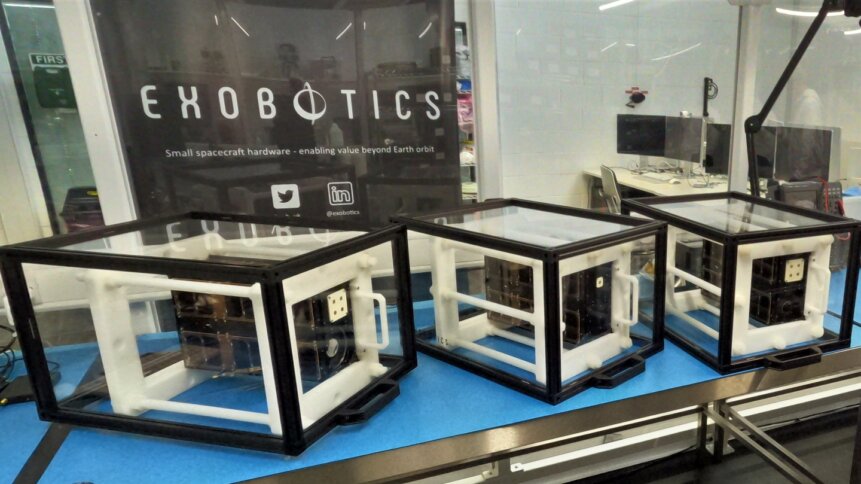CubeSat firm Exobotics adds satellites to shopping cart

Today, online stores give shoppers access to a diverse range of products. And pushing the envelope are CubeSat compatible parts ready for lift-off. UK space-tech firm Exobotics’ online store lets customers ‘browse, pick and customize’ various satellite components to satisfy mission requirements. Products include satellite subsystems, buses and roving platforms, as well as ground support and test equipment. And the list is eye-catching in more ways than one.
New Space
Having an online store is a clever way for Exobotics to highlight how accessible space technology has become. CubeSat specifications developed at the end of the 1990s have ushered in a new wave of affordable – in space terms – technology that has captured the interest of a much wider customer base. But the question facing clients that want to jump on board is how to get their ideas off the ground? The price may now be within reach, but regular companies often have little knowledge of how to build their own satellites and prepare them for launch. And this is where Exobotics fits in – to help customers test potentially profitable ideas in space.
“We’re their in-house satellite development team,” Nadeem Gabbani, CEO of Exobotics, told TechHQ. “We can do the operations and take care of the ground support side of things too.” The startup, which has offices in London, Cambridge, and further South West in the UK – giving them easy access to Spaceport Cornwall – is on a mission to lower the barriers to entry for companies wanting to profit from satellite technology. For example, fintech firms may want to launch an imaging payload that allows traders to monitor commodities – not by relying on typical data feeds in the City, but by viewing crops from space as they are developing in the field.
The advantage of space compared with using aircraft, or more recently, drone technology, is the huge uplift in terms of coverage. CubeSat designs, far more affordable than conventional satellites, allow customers to target locations that are not served by big-name missions such as NASA and ESA programmes. What’s more, even if satellite coverage already exists, the payload may not be capable of providing the exact data that a firm may want. Nanosatellites can cater for a wide variety of missions –for example, to support innovative IoT projects, radiofrequency use cases, GPS alternatives, and the list goes on.
“You need a good understanding of your customers’ requirements,” said Gabbani, explaining the key first step in the process. “We make validating ideas easy and fast.” Exobotics can help clients to go from idea to launch over a period of somewhere between 18 and 24 months. Or, for a fast-track program, in as little as one year. Gabbani is careful to keep his clients’ commercial intentions secret, but he does share some more general details on future programs.
CubeSat validation
Exobotics’ first satellites – three 6U CubeSat configurations – are due to be launched in a few months’ time as part of a scheduled SpaceX launch in the US. Putting satellites into space requires that modules undergo rigorous testing. In fact, payloads will be refused launch by rocket operators if developers can’t show valid test data.
At a high level, CubeSat modules are put into a ‘dispenser’, which is loaded onto a launch rocket. And, at the right moment up in space, the satellites are pushed out of their container using a ‘jack in the box’ like spring. Designs need to be able to withstand forces at all stages of the mission.
Exobotics’ first products were equipment to help satellite builders better evaluate their designs. “Around 25% of CubeSat failures are down to a lack of ground testing,” said Gabbani. “And often testing was only being done right at the end.” Desktop kit devised by the Exobotics team made it easier for developers to assess their satellites throughout the entire build phase, not just at its conclusion. Also, the units – which allow vibration testing and thermal cycling (required to evaluate the integrity of solder connections in payload electronics) – were built specifically for CubeSat specified products. Previously, developers had been making do with older kit that was originally intended to check larger satellites.
Gabbani’s attention to detail shines through together with his passion for building satellites. His undergraduate studies were almost derailed because he couldn’t tear himself away from the CubeSat projects that got him started on the journey to create Exobotics. The company benefits from the investment that the UK is making in space technology, which includes the creation of Spaceport Cornwall – a facility that currently hosts Virgin Orbit.
Exobotics is grateful for the support of Aerospace Cornwall, which was invaluable in helping to get the space-tech firm up and running. And today, thanks to growing interest from customers, the startup has recently opened a new engineering lab and clean room facility. Revenue is reportedly £4 million, which cements a firm foundation for building affordable cubesat shaped satellites, and gives businesses a wealth of knowledge to tap into. Watch this space.









